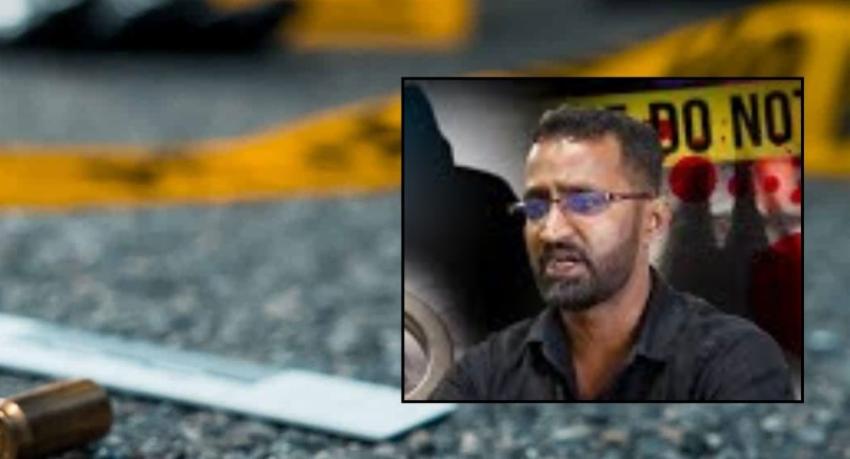
In a chilling revelation that underscores the entanglement of Sri Lanka’s political elite, military, police, and the underworld, the murder of Aruna Vidanagamage, also known as Meegas-Are' Kajja, has brought to light the existence of a paramilitary criminal network operating with impunity and political patronage.
This shadowy network, which allegedly includes former military personnel, police officers, and organized crime figures, has long been accused of working hand-in-glove to protect powerful political interests, particularly those associated with the Rajapaksa family.
On February 18th, Aruna Vidanagamage and his two young children were ambushed and fatally shot in Middeniya, Hambantota. The attack, carried out with a T-56 firearm, routinely issued to the Sri Lankan military, occurred as Vidanagamage and his children were traveling on a motorcycle. His six-year-old daughter and nine-year-old son succumbed to their injuries while receiving treatment in the hospital. Vidanagamage, a controversial figure in the Hambantota District, had faced multiple accusations of illegal activities, including extortion and illegal possession of firearms. He was also known for his close ties to prominent politicians in the region.
Before his murder, Vidanagamage had publicly claimed to possess sensitive information regarding the murders of Tajudeen, a former provincial council member, and others. He had filed a complaint seeking protection, fearing repercussions for revealing this information. In a statement, he warned, “If something happens to my life, all this evidence will come to the media.”
The Sri Lanka Police have since arrested six individuals, including military officers, former military personnel, and police officers, in connection with the murder. Senior Superintendent of Police (SSP) Buddhika Manatunga, the Police Spokesperson, stated that the murder was orchestrated from abroad and that investigations are ongoing to identify the masterminds behind the crime.
The murder of Vidanagamage, however, is not an isolated incident but part of a broader pattern of violence and organized crime linked to political figures. The case echoes the 2003 murder of former Provincial Council Member M.K. Ranjith, known as “Chandi Malli,” who was killed in a high-security zone in Colombo. Ranjith’s son, Amila Megasdeniya, recently took to social media to express his frustration over the lack of progress in the investigation, noting that the case file remains with the Attorney General after 22 years. He implicated several high-profile politicians, including the Rajapaksas, in the political machinations surrounding his father’s murder.
Deputy Minister of Public Security, Attorney-at-Law Sunil Watagala, has raised suspicions about attempts to conceal evidence in certain high-profile cases, suggesting that politicians may be shielding notorious criminals. Cabinet Spokesperson Minister Nalinda Jayatissa, however, downplayed these concerns, describing the ongoing incidents as conflicts between organized crime gangs rather than a national security issue.
A year before his death, Vidanagamage gave a revealing interview to journalist Chamuditha Samarawickrama, in which he admitted to his involvement in the Rajapaksa family’s “dirty work.” He described how he and others in the underworld were used to protect the family’s interests, often through violent means. Vidanagamage recounted how Kapila Dissanayake, a relative of Mahinda Rajapaksa, had tasked him with saving his family during the Aragalaya protests in May 2022. He denied direct involvement in the murders that occurred during the chaos but acknowledged his loyalty to the Rajapaksas.
In the interview, Vidanagamage also implicated Neville, a former army officer and head of Mahinda Rajapaksa’s security, as a key figure in Tangalle’s criminal and political operations. He claimed that Neville wielded significant influence over local police and businesses, ensuring that anyone who opposed him faced dire consequences. Vidanagamage expressed regret for his role in supporting the Rajapaksas, stating, “We lied and got them votes. Then people are coming and telling us that they have no money and no jobs.”
Excerpts from the Interview:
Chamuditha: “You are known to be Rajapaksa’s henchman.”
Kajja: “No, that’s not true.”
Chamuditha: “You undertook a contract to kill three people to save the Rajapaksas.”
Kajja: “I got a call from Kapila Dissanayake, Mahinda’s uncle’s son. He told me his house was set on fire and asked me to save his family. I went there and chased people away. I saved his family.”
Chamuditha: “You were their lapdog, willing to do anything they asked.”
Kajja: “Yes, that is true. We were loyal to them.”
Chamuditha: “Who shot those three people?”
Kajja: “There were witnesses, but because I was close to the family, I was unfairly blamed. It was proved I had nothing to do with it.”
Chamuditha: “You are a murderer, affiliated with organized crime.”
Kajja: “I don’t accept that. But at that incident, without shouting at people, I couldn’t do anything.”
Chamuditha: “Why are you ashamed?”
Kajja: “Because we worked for them and thought the people were wrong to hate them. Now we know.”
Chamuditha: “What did you do for the Rajapaksas?”
Kajja: “We were blind to their wrongdoings. I am not afraid, even if I die tomorrow. I stood up.”
Chamuditha: “Why are you taking the risk? Don’t you have a wife and kids?”
Kajja: “I do, but up to when can we stay silent about what the Rajapaksas have done?”
The interviewer, Samarawickrama, has now been provided with additional police security, following increased threats to his life and amidst the deaths of his four interviewees.According to police reports, 17 shooting incidents have been reported in the first two months of 2025 alone resulted in 17 deaths, with 11 of these linked to organized crime groups. The use of military-grade weapons like the T-56 firearm in these attacks highlights the involvement of trained personnel.
The spate of violence comes as the newly elected Sri Lankan government looking to crack down on the Rajapaksa's financial crimes. The link between the two and the ties between Sri Lanka's political and criminal landscape cannot be ignored.
